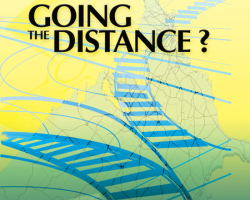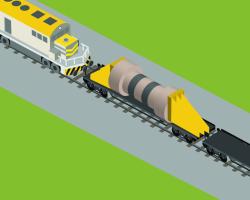Category of Content
Siting Experience Documents Only
Publication Date
Subject Matter
Keywords
M4SF-19ID020303045- Atlas Railcar Phase 3 Final Report
M4SF-19ID020303045- Atlas Railcar Phase 3 Final Report
Performance Specification for Standardized Transportation, Aging, and Disposal Canister Systems
Performance Specification for Standardized Transportation, Aging, and Disposal Canister Systems
Appendix B – Revised Railcar-to-Cradle Attachment Interface
Appendix B – Revised Railcar-to-Cradle Attachment Interface
Appendix D – Revised Conceptual Cradle Design Family 4
Appendix D – Revised Conceptual Cradle Design Family 4
Standardized Transportation, Aging, and Disposal Canister Feasibility Study
Standardized Transportation, Aging, and Disposal Canister Feasibility Study
The Social and Ethical Aspects of Nuclear Waste
The Social and Ethical Aspects of Nuclear Waste
Nuclear waste management seems to exist in a perpetual state of crises. For 50 years the nuclear states of the world have fought, and generally lost, the battle to deal with the nuclear waste problem. Worldwide, there is a growing acknowledgement within industry and government that social and ethical issues are just as important as technical issues when developing safe programs for nuclear waste management. This paper is a review of some of the outstanding social and ethical issues that are influencing discussions on nuclear waste management around the world.
Respecting free, prior and informed consent: Practical guidance for governments, companies, NGOs, indigenous peoples and local communities in relation to land acquisition
Respecting free, prior and informed consent: Practical guidance for governments, companies, NGOs, indigenous peoples and local communities in relation to land acquisition
Large-scale investments in land are spreading faster than ever before across the global south. Often these investments target lands governed by customary rights that are not adequately recognized and protected under national laws, or sites where governments lack the capacity to enforce the law. Land deals that change the use of land and natural resources have wide implications for indigenous peoples and local communities who depend primarily on these resources for their livelihoods, welfare and cultural identity.
What’s Fairness Got to Do with It? Environmental Justice and the Siting of Locally Undesirable Land Uses
What’s Fairness Got to Do with It? Environmental Justice and the Siting of Locally Undesirable Land Uses
Policy makers and local land use officials have long struggled to cope with the "not in my backyard" (NIMBY) syndrome in attempting to site "locally undesirable land uses" (LULUs), such as homeless shelters, drug or alcohol treatment centers, and waste disposal facilities. In general, LULUs are considered beneficial to society at large,' and many agree that they should be located somewhere. Those same citizens protest vigorously, however, when such a use is sited near their homes. This protest is quite rational.
Respecting free, prior and informed consent: Practical guidance for governments, companies, NGOs, indigenous peoples and local communities in relation to land acquisition
Respecting free, prior and informed consent: Practical guidance for governments, companies, NGOs, indigenous peoples and local communities in relation to land acquisition
The FAO Governance of Tenure Technical Guides are part of FAO’s initiative to help develop capacities to improve tenure governance and thereby assist countries in applying the Voluntary Guidelines on the Responsible Governance of Tenure of Land, Fisheries and Forests in the Context of National Food Security. The FAO Governance of Tenure Technical Guides are prepared by technical specialists and can be used by a range of actors.
Views and Attitudes toward Nuclear Waste: National Survey Final Report
Views and Attitudes toward Nuclear Waste: National Survey Final Report
In 2002, the federal government passed a law to create the Nuclear Waste Management Organization, also known by its initials NWMO. The Nuclear Waste Management Organization (NWMO) was established by Ontario Power Generation Inc., Hydro-Québec and New Brunswick Power Corporation in accordance with the Nuclear Fuel Waste Act (NFWA) to assume responsibility for the long-term management of Canada’s used nuclear fuel. More specifically, the NWMO’s initial objective was to recommend a long-term approach for managing used nuclear fuel produced by Canada’s electricity generators.
Free, Prior and Informed Consent in Fulfilling the Constitutional Rights of Citizens in the Mining Sector
Free, Prior and Informed Consent in Fulfilling the Constitutional Rights of Citizens in the Mining Sector
Based on data from the Directorate General of Mineral and Coal, Ministry of Energy and Mineral Resources, in 2017, there are 9,353 Mining Business Licenses (MBL) with 9,074 MBLs entered in the DG of Mineral and Coal database. Of these, 6,565 MBLs passed the CnC requirements, while the remaining 2,509 MBLs were categorized as non-CnC. The focus of the problems studied are: (1) What is the Direction of Changes in Government Policy in the Mining Sector?
Social Distrust: Implications and Recommendation for Spent Nuclear Fuel and High Level Radioactive Waste Management
Social Distrust: Implications and Recommendation for Spent Nuclear Fuel and High Level Radioactive Waste Management
This review develops recommendations for moving forward with SNF and HLW management in a context of social distrust, while also working to regain social trust over the long term. We begin with a short overview of social trust and confidence, including definitions, how it is built and destroyed, and trends in social trust in the US. We then turn to the implications of dilemmas and trade-offs that arise for the design and implementation of a system that has requirements in addition to trust and confidence.
Going the Distance? The Safe Transport of Spent Nuclear Fuel and High-Level Radioactive Waste in the United States - Summary
Going the Distance? The Safe Transport of Spent Nuclear Fuel and High-Level Radioactive Waste in the United States - Summary
This new report from the National Research Council’s Nuclear and Radiation Studies Board (NRSB) and the Transportation Research Board reviews the risks and technical and societal concerns for the transport of spent nuclear fuel and high-level radioactive waste in the United States. Shipments are expected to increase as the U.S. Department of Energy opens a repository for spent fuel and high-level waste at Yucca Mountain, and the commercial nuclear industry considers constructing a facility in Utah for temporary storage of spent fuel from some of its nuclear waste plants.
Transportation Institutional Issues Involving the U.S. Department of Energy's Civilian Radioactive Waste Management Program: The Post Yucca Mountain Years
Transportation Institutional Issues Involving the U.S. Department of Energy's Civilian Radioactive Waste Management Program: The Post Yucca Mountain Years
This 10th anniversary update to the original archive adds several sections that cover relevant topics since 2010. Some of the new topics include the Blue Ribbon Commission on America's Nuclear Future, consent-based siting, tribal engagement, shutdown site visits, and industry interests. Much like the first publication, the purpose of this update is to make it easier for new personnel to learn about what came before them in the hope that this knowledge gives them a greater chance of success.


